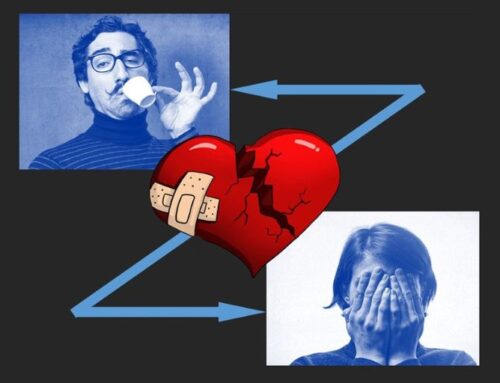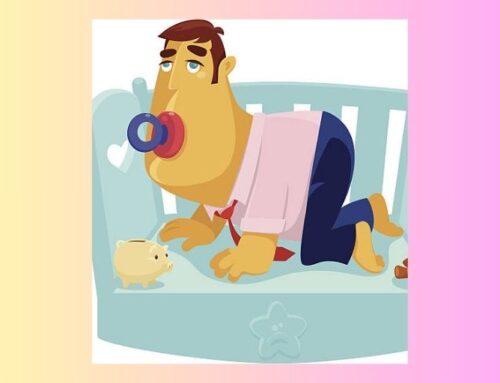“Guilt: The gift that keeps on giving.” Erma Bombeck
In a previous post (Good Shame/Bad Shame), I posited that in evolutionary terms we are wired for shame. I also proposed that while shame in its intended form is a natural, normal emotion, it can become unhealthy or toxic.
The same can be said of guilt, which is the focus of this piece.
To begin with, let’s look at the relationship between guilt and shame.
Guilt and Shame
“The difference between shame and guilt is the difference between ‘I am bad’ and ‘I did something bad’”. Brené Brown
There is often confusion about the difference between guilt and shame, so much so that they are thought to mean the same thing. But there is a distinction to be made between them.
- Guilt arises out of our actions – we’ve done or not done something that has directly or indirectly resulted in harm.
- Shame is the internalized sense that we are intrinsically flawed, bad or out of step with others of our kind. Our sense of shame may be linked to our actions or our inaction, but not necessarily. It might also be an emotion, which has become embedded in our sense of self.
- Guilt and shame often walk together hand in hand.
Healthy Guilt
“Guilt is the worst demon to bear, strangling you from the inside of your body. Apologise. Make amends. Let go. Breath Free.” Nikita Gill
We experience healthy, natural guilt when we know that we have acted improperly or failed to act properly. It’s the kind of guilt felt by persons of conscience when they have done something that results in harm.
If we take responsibility for our actions and then take steps to repair the harm we did, then our sense of guilt will likely be resolved or at least diminished. These steps may also result in the releasing of our sense of shame around the behavior in question.
If we do nothing to repair the harm, either directly or indirectly, then our burden of guilt and any associated shame will likely increase over time, thus creating a heavy burden to for us to carry – a burden that will certainly take a toll on us mentally, physically and spiritually.
But What of Unhealthy Guilt?
“The worst guilt is to accept an unearned guilt.” Ayn Rand
Unhealthy guilt results from an overblown sense of responsibility for real or imagined actions. For example:
- Imagined hurts that we have caused to others and even sometimes to ourselves.
- Taking too much responsibility for events in which we’ve only played a minor role or over which we had no control.
- Exaggerating the extent or seriousness of harm that may have been caused by our actions.
In other words we become good story tellers about what we did or didn’t do and its impact, if any. As a result we create a living hell for ourselves because there is no resolution for this type of guilt.
The Source of Our Unhealthy Guilt
“Glory, built on selfish principles, is shame and guilt.” William Cowper
We could call this fabricated guilt of ours “vain imaginings”.
What I mean is that the source of unhealthy guilt is a weird kind of vanity that derives from an egoic need to be more powerful and more important than we actually are. For example:
- We believe that we have the power to control other people and situations – a kind of causal power almost like the ability to change the weather or turn the ocean’s tides.
- We believe that we are the source of much that goes on around us. Thus, we need to be perfect. If we are not perfect, then we are not only worthless, but we will also have set in train some sort of catastrophic event.
This pointlessly painful need is usually hidden from our eyes and so we have to dig deep to find it in order to recognize it for what it is.
It is then that we can begin to correct it.
The Vanishing – Healing Unhealthy Guilt
“Guilt can either hold you back from growing or it can show you what you need to shift in your life.” Anonymous
When the pain becomes too much to bear, we might be moved to adopt certain practices – after all what we are doing now isn’t working and is only making our lives more difficult.
Here are some suggestions for releasing misguided, unhealthy guilt and its associated suffering.
Acquiring perspective. We acquire perspective when we see the truth of our unfounded guilt – that our assumption of guilt was a trick of the mind. That we were operating from an distorted perception of our own power and responsibility.
Developing self-acceptance. Once we see and accept that we are not perfect and never will be, we will see that our lack of perfection is not only okay, but perfect in its own way. Life is about learning and not about becoming god-like. And we begin to see that our continual quest for perfection creates unnecessary suffering for us.
Right-sizing our ego. Once we see the lies our minds and egos have been telling us, then we can begin to reduce our egoic response. By that I mean, that we come to see that we are not all that important or powerful. We begin to see that we are not the source of all bad things in the world. We begin to see that others may not even be aware of our actions. We can see that others are more concerned about their own lives and are not focused on us and our imagined missteps. In other words, it is likely that we don’t even register on their radar.
Managing our boundaries. Once our ego is somewhat right-sized, then we begin to discern where we leave off and others begin. We start to accept that our power over other people, places and things is very limited if non-existent. We begin to understand that our job is to keep our hands off of other people’s business and to place our focus where it should be – on our lives, our actions and our choices.
It is at this point that we are free to relax and let go of what is outside of our power. As our painful egoic needs and drives vanish, life becomes simpler. The ruminating brain quiets down. And we experience a strange new feeling — a sense of peace and okay-ness with ourselves, our relationships and our own little world.







